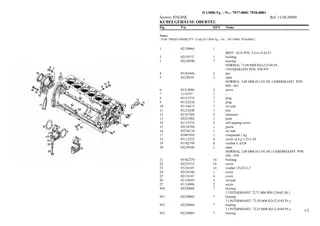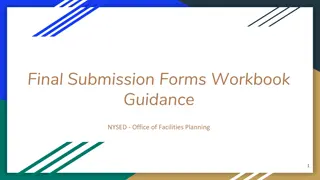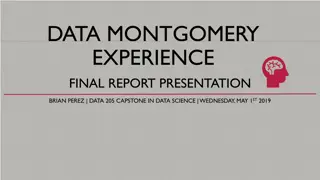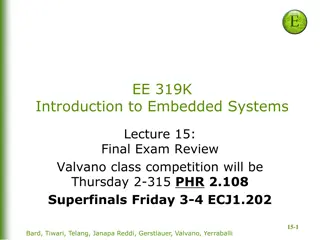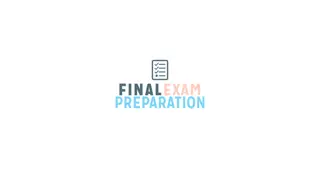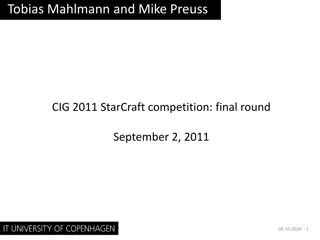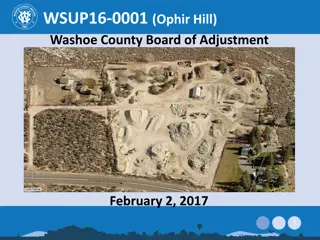
Florida Construction Licensing Regulations Overview
Learn about the mandatory licensing requirements for construction activities in Florida set by the Construction Industry Licensing Board. Explore the duties, history, and legal framework governing qualifying agents and contractors in the state. Discover the role of the Florida Department of Business and Professional Regulation in regulating and licensing contractors.
Uploaded on | 1 Views
Download Presentation

Please find below an Image/Link to download the presentation.
The content on the website is provided AS IS for your information and personal use only. It may not be sold, licensed, or shared on other websites without obtaining consent from the author. If you encounter any issues during the download, it is possible that the publisher has removed the file from their server.
You are allowed to download the files provided on this website for personal or commercial use, subject to the condition that they are used lawfully. All files are the property of their respective owners.
The content on the website is provided AS IS for your information and personal use only. It may not be sold, licensed, or shared on other websites without obtaining consent from the author.
E N D
Presentation Transcript
1 CLC Qualifying Agents: Duties, History and Litigation February 13, 2023 Hardy L. Roberts, III & Mark Smith Carey, O Malley, Whitaker, Mueller, Roberts & Smith, P.A.
Almost every construction activity in the State of Florida requires licensure of the individual and/or business entity performing the activity, unless exempt. The Florida Legislature has deemed regulation of contracting necessary for the protection of the health, safety and welfare of Florida's public. This purpose is accomplished by the licensing of Florida's contracting professionals and the creation of the Construction Industry Licensing Board . Licensing Basics 2
The Florida Department of Business and Professional Regulation ("Department") is the executive agency which houses the CILB and is tasked with the regulation, licensing and discipline of Florida's contractors through its various regulatory Boards. Licensing Basics 3
Section 489.105(3)Contractor the person who is qualified for, and is only responsible for, the project contracted for and means, except as exempted in this part, the person who, for compensation, undertakes to, submits a bid to, or does himself or herself or by others construct, repair, alter, remodel, add to, demolish, subtract from, or improve any building or structure, including related improvements to real estate, for others or for resale to others; and whose job scope is substantially similar to the job scope described in one of the paragraphs of this subsection. 4
1. general contractors; 2. building contractors; residential contractors; 3. sheet metal contractors; 4. roofing contractors; 5. three classes of air- conditioning contractors; 6. mechanical contractors; 7. three types of pool/spa contractors; 8. plumbing contractors; underground and excavation contractors; 9. solar contractors; and pollutant storage systems contractors. Covered Contractors 5
Section 489.105(6) Contracting "Contracting" means, except as exempted , engaging in business as a contractor and includes, but is not limited to, performance of any of the acts as set forth in subsection (3) which define types of contractors. The attempted sale of contracting services and the negotiation or bid for a contract on these services also constitutes contracting. If the services offered require licensure or agent qualification, the offering, negotiation for a bid, or attempted sale of these services requires the corresponding licensure . 6
Exemptions from Licensure Casual, minor, or inconsequential work with an aggregate price less than $1,000 is exempt unless (a) the work is part of a larger operation or where the operation is divided into contracts of less than $1,000; or (b) a person advertises or represents that he or she is a contractor or is otherwise qualified to engage in contracting. -- 489.103(9) 7
Exemptions from Licensure By rule, the Board has stated: [A]ctivities which are not casual, minor or inconsequential, include, but are not limited to, any work affecting structural components, any work involving use of toxic or hazardous chemicals or substances, any work affecting access or egress to a structure, any work affecting accommodations for the physically disabled, any work for which a building permit is required and any work affecting life-safety matters as defined in the applicable building code. -- Fla. Admin. Code R. 61G4-12.011(2). 8
Exemptions from Licensure Other exemptions from licensure exist. For example, contractors working on bridges, roads, streets, highways, railroads and utilities, and those who supply incidentalservices to these contractors are exempt. -- 489.103(1). 9
Exemptions from Licensure Under certain circumstances, employees of certified or registered contractors acting within the scope of the license held by the certified or registered contractor are exempt so long as they do not: (i) hold themselves out to be licensed or qualified by the licensee; (ii) lead the consumer to believe they have an ownership or management interest in the company; or (iii) perform any act constituting contracting See Scott & Sons Eng g, Inc. v. Tarafa Construction, Inc., 907 So. 2d 553, 554 (Fla. 4th DCA 2005) ( Only employees of a licensed contractor performing work within the scope of the license are exempt from the contracting requirements of the statute. ) 1 0
Certified vs. Registered Certified is statewide Registered is local 1 1
Design-Build Contracts Under certain circumstances, Florida permits licensed professionals, or licensed or registered contractors, to offer design- build services, without having to be licensed as both a contractor and a design professional. For example, the statute provides: an architect or landscape architect licensed pursuant to [the Florida Statutes] or an engineer licensed pursuant to [the Florida Statutes] who offers or renders design-build services which may require the services of a contractor certified or registered pursuant to the provisions of this Chapter, as long as the contract or services to be performed under the terms of the design-build contract are offered and rendered by a certified or registered general contractor. -- 489.103(16). 1 2
Contracting by Business Entities Any partnership, corporation, business trust, or other legal entity acting in any name other than the applicant s legal name or a fictitious name where the applicant is doing business as a sole proprietorship must apply for a certificate of authority through a qualifying agent under the fictitious name. The business can only obtain a certificate of authority in the category of business for which the qualifying agent is certified or registered. 1 3
Contracting by Business Entities Any partnership, corporation, business trust, or other legal entity acting in any name other than the applicant s legal name or a fictitious name where the applicant is doing business as a sole proprietorship must apply for a certificate of authority through a qualifying agent under the fictitious name. The business can only obtain a certificate of authority in the category of business for which the qualifying agent is certified or registered. This includes joint ventures. 1 4
The Qualifying Agent The business s qualifying agent must be an individual who: (i) possesses the requisite skill, knowledge, and experience; (ii) has the responsibility, to supervise, direct, manage, and control the contracting activities of the business; (iii) has the responsibility to supervise, direct, manage, and control construction activities on each job for which he or she obtains a building permit; and (iv) has met the technical and personal qualifications established by Florida s construction licensing law. 1 5
The Qualifying Agent The qualifying agent must affirm that he has final approval for all business matters, unless a separate financially responsible officer is approved. submit a credit report from a nationally recognized credit agency reflecting the applicant s financial responsibility. The Board will then investigate the financial responsibility, credit, and business representation of the qualifying agent and business organization. If the Board finds that the qualifying agent has been involved in past disciplinary actions or the Board discovers any grounds that would warrant the denial of individual certification, the Board may deny the application. 1 6
The Qualifying Agent Responsibilities of Primary Qualifying Agent [The] "Primary qualifying agent" person who possesses the requisite skill, knowledge, and experience, and has the responsibility, to supervise, direct, manage, and control the contracting activities of the business organization with which he or she is connected; who has the responsibility to supervise, direct, manage, and control construction activities on a job for which he or she has obtained the building permit; and whose technical and personal qualifications have been determined by investigation and examination as provided in this part, as attested by the department. -- 489.105(4) 1 7
The Qualifying Agent Responsibilities of Secondary Qualifying Agent [The] person who possesses the requisite skill, knowledge, and experience, and has the responsibility to supervise, direct, manage, and control construction activities on a job for which he or she has obtained a permit, and whose technical and personal qualifications have been determined by investigation and examination as provided in this part, as attested by the department. A secondary qualifying agent is responsible only for (1) supervision of field work where his or her license was used to obtain the building permit; and (2) any other work for which he or she accepts responsibility. A secondary qualifying agent is not responsible for supervision of financial matters. 1 8
The Qualifying Agent Pursuant to Section 489.1195(1)(a), Florida Statutes, an organization's primary qualifying agent(s) is responsible for supervision of all operations of the business, and all field work at all work sites, and for all financial matters for the organization and each specific job. A qualifying agent may eliminate their responsibility over the businesses financial matters by designating a Financially Responsible Officer (FRO). Pursuant to section 489.1195(1)(b), Florida Statutes, an FRO, upon approval by the Board, shall become responsible for all financial matters of the business. An FRO may not be the primary qualifier. 1 9
The Qualifying Agent Emergency Registration upon Death of Qualifier Pursuant to section 489.121, Florida Statutes, a qualified business organization whose qualifier has passed away may request an emergency registration for the purpose of completing current contracts. A person may request an emergency registration even if he or she is not currently licensed as a contractor. The registrant must notify the Board within thirty (30) days and submit a list of all pending contracts along with a letter outlining the registrant's knowledge of the contracts and the ability to complete those contracts. Once approved, the registrant may complete the pending claims. There is no limit on the amount of time that the registrant may take to complete the contracts. 2 0
The Qualifying Agent Retirement or Termination of a Qualifier If a qualified business's only certified or registered contractor terminates his or her affiliation with the business, the business shall have sixty (60) days from the termination of the qualifying agent's affiliation to employ a new qualifier. The business organization may not engage in contracting until a qualifying agent is employed, unless the executive director or chair of the Board has granted a temporary nonrenewable certificate or registration to an appropriate officer of the business, who assumes all responsibilities of a primary qualifying agent for the business organization. This temporary certificate or registration allows the business to proceed on incomplete contracts only during the sixty-day time frame. The business cannot enter any new contracts until they retain a new qualifying agent. 2 1
Qualifying Agent: Potential Liability Rules have been promulgated under the Florida Deceptive and Unfair Trade Practices Act concerning home construction and improvement, and a construction contractor may be held liable under the Act for false representations made to customers. An owner may recover from a negligent qualifying agent, but only under a common law theory of negligence or through the administrative remedies available pursuant to the provisions pertaining to construction contracting. A corporation's qualifying agent may not be held individually liable for a breach of the duty created by the statutes pertaining to the certification or registration of business organizations and qualifying agents' responsibilities. The mere fact that an employee is also the qualifying agent on a job does not destroy or eliminate his entitlement to immunity and the protection of his worker's compensation insurance. Murthy v N. Sinha Corp. (1994, Fla) 644 So 2d 983, 19 FLW S429 2 2
Qualifying Agent: Potential Liability Neither FS 489.119 nor 489.129, regulatory and penal statutes, creates a private cause of action against an individual qualifier for a corporation acting as a general contractor. Nor was there evidence of a legislative intent to create a private remedy on behalf of individuals. However, a claim against the qualifying agent for common-law negligence may state a cause of action. Finkle v Mayerchak (1991, Fla App D3) 578 So 2d 396, 16 FLW D1023. If a qualifying agent does not fulfill their obligations, however, the contractor could face administrative sanctions: Fines Suspensions Criminal charges License revocation. 2 3
Qualifying Agent: Potential Liability Also, note--Taylor Morrison Services, Inc. v. Ecos, 2015 WL 3407929 (Fla. 1stDCA May 28, 2015): Section 489.128 requires a contractor to have at its disposal a person who is recognized as a qualifying agent and who is licensed to perform the work, as of the effective date of the contract. Under the plain language of the statute, whether that person ultimately obtains the permit or supervises construction on the project is irrelevant to whether the contractor is licensed. 2 4
Qualifying Agent: Potential Liability There are numerous ongoing suits, involving qualifiers. Boundaries of negligence and scope of obligations are being tested regularly. The issue does not appear fully settled. 2 5
Qualifying Agent: Potential Liability Alles v. DBPR, CILB, 423 So. 2d 624 (Fla. 5th DCA 1982) Qualifying agent owes duty to supervise corporate principal s construction projects. Hunt v. DBPR, CILB, 444 So. 2d 997 (Fla. 1st DCA 1983) Two of the multiple qualifying agents of corporate principal were sufficiently involved in project to support liability for failure to supervise. Gatwood v. McGee, 475 So. 2d 720 (Fla. 1st DCA 1985) Qualifying agent s negligent performance of statutorily imposed duty of supervision may support cause of action for damages and qualifying agent s duty of supervision is nondelegable 2 6
Qualifying Agent: Potential Liability Murthy v. Sinha, 644 So. 2d 983 (Fla. 1994) Chapter 489 does not create private cause of action against qualifying agent. .[A]n owner may recover from a negligent qualifying agent, but only under a common-law theory of negligence or through the administrative remedies available pursuant to chapter 489. [W]e reject the First District s conclusion that a corporation s qualifying agent may be held individually liable for a breach of the duty created by sections 489.119 and 489.1195. 2 7 Gatwood disapproved to the extent it conflicts.
Qualifying Agent: Potential Liability Seabridge, Inc. v. Superior Kitchens, Inc., 672 So. 2d 848 (Fla. 4th DCA 1996) Murthy provides administrative remedies but does not itself expressly provide for a civil cause of action; the supreme court declined to infer any civil liability . Qualifying agent not jointly and severally liable with Corporation for failure to pay subcontractor. 2 8
Qualifying Agent: Potential Liability Evans v. Taylor, 711 So. 2d 1317 (Fla. 3d DCA 1998) Allegations that qualifying agent himself undertook repairs to [the] residents which were defective and not in compliance with applicable building codes. Homeowner sought relief under Chapter 501 for unfair and deceptive trade practices. Summary judgment in favor of qualifying agent based on Murthy reversed. 2 9
Qualifying Agent: Potential Liability Shimkus v. DBPR, CILB, 932 So. 2d 223 (Fla. 4th DCA 2005) Under Murthy, [h]omeowner may not be able to sue the licensee, who is not a party to the contract. 3 0
Qualifying Agent: Potential Liability Scherer v. Villas Del Verde Homeowners Association, Inc., 55 So. 3d 602 (Fla. 2d DCA 2011) Thus, today we make explicit what is perhaps implicitly stated in Murthy: a qualifying agent s breach of the duties imposed by chapter 489 does not give rise to a claim against the qualifying agent under section 553.84 for a building code violation. QA s failure to supervise was not a violation of the building code. See n.4 re Section 553.74(3). Current version provides: Provisions relating to the personnel, supervision or training of personnel, or any other requirements relating to contractors or their workforce may not be included within the Florida Building Code, and subsections (4), (6), (7), (8), and (9) are not to be construed to allow the inclusion of such provisions within the Florida Building Code by amendment. professional qualification 3 1
Qualifying Agent: Potential Liability Hucke v. Kubra Data Transfer Ltd., Corp., 160 F. Supp.3d 1320 1326 (S.D. Fla. 2015) (Judge Rosenberg) This court agrees with Defendant that Murthy stands for the proposition that, where a defendant has injured a plaintiff in a way that gives rise to a common-law claim , The mere fact that the defendant might have also violated a statute without any private right of action does not preclude a plaintiff from asserting its existing common-law claims. (Citation omitted). However, [n]othing in Murthy stands for the proposition that a plaintiff may assert a common-law claim where Plaintiff has not alleged any injury that would exist independent of the purported statutory violations. 3 2
Qualifying Agent: Potential Liability General Property Construction Co. v. Empire Office, Inc., 2019 WL4010334 (S.D. Fla. 2019) (Judge Scola) The Florida Supreme Court held that although a qualifying agent for a corporation has a duty to supervise a corporation s construction projects under sections 489.119 [and] 489.1195, Florida Statutes, the failure to meet that duty does not give rise to a private cause of action against a corporation s qualifying agent. (Citing Murthy). In other words, merely breaching the statutory duty to supervise the construction project cannot give rise to a negligence claim. Only if Empire alleged that it suffered some injury independent of the alleged statutory violations, i.e. an injury not resulting from [the qualifying agent s] failure to supervise, can it sufficiently state a claim. (Citing Hucke). 3 3
34 THANK YOU! Please call or email with any questions or comments. Hardy L. Roberts, III & Mark Smith Carey, O Malley, Whitaker, Mueller, Roberts & Smith, P.A.




